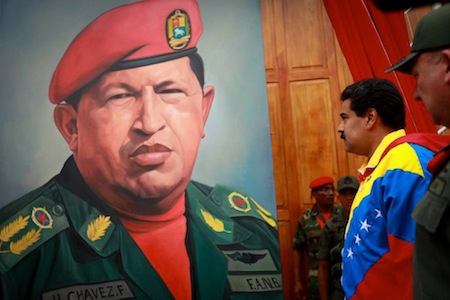Venezuelan president Hugo Chávez has died today at age 58 after a long battle with cancer, and that sets off a snap 30-day campaign to select his successor. ![]()
Putting aside politics and policy for a moment, it is clear that Chávez commanded a huge amount of support among the 29 million residents of Venezuela. Though many critics, both within Venezuela and outside the country, especially in the United States, found his style of populist ‘bolivarian’ socialist government offensive, his largest legacy may well be addressing poverty in Venezuela after decades of leaders ignored Venezuela’s poorest– and even lift many Venezuelans out of poverty with massive amounts of social welfare spending on health, education and other support through his misiones, though we’ll leave for another day the question of whether that spending, based largely on Venezuelan natural resources and high global demand for oil, is sustainable in the long run.
It’s a testament to Chávez’s influence that Henrique Capriles, his opponent in the October 2012 presidential election, campaigned on a basis of retaining many of the misiones. Although Chávez won reelection with nine-point victory over Capriles, the opposition made clear to Venezuelans that, to some degree, ‘we’re all chavistas, now.’ (follow all of Suffragio‘s coverage here).
His legacy will also be one of a troubling, divisive, oppressive autocrat — an erratic style of rule that diminished press freedom and blurred the line between the military, the government and politics. Although elections remained free in Venezuela under Chávez, his mobilization of government to support his political survival meant that elections weren’t necessarily fair. He also championed an anti-imperialist style that antagonized the United States and other Western governments (he famously called former U.S. president George W. Bush ‘Mister Danger‘ and a donkey), seeking instead common cause with countries like Iran and other rogue states.
But Chávez’s health — which was always an issue, however muted, during the campaign — took a turn for the worse after his reelection. He departed for Cuba very soon after the election for cancer treatment, missing his own re-inauguration, and really since the day he was reelected, Venezuela’s been trapped in a bit of political paralysis with a president on what turned out to be his deathbed.
Upon reelection, Chávez was scheduled to have remained in office through January 2019; now that he’s died in office, Venezuela faces a snap election to be held within 30 days.
That’s right — Chávez’s successor will be chosen by April 5.
Before leaving for treatment in Cuba, Chávez appointed a new vice president, former foreign minister Nicolás Maduro, and anointed him specifically as his successor. That means Maduro is likely to lead Chávez’s ruling Partido Socialista Unido de Venezuela (PSUV, or United Socialist Party of Venezuela) into the snap election, though it’s possible that Diosdado Cabello, the speaker of the National Assembly, could attempt to win the presidential nomination. Given the outpouring of sympathy for Chávez, though, and the suddenness of the election, that seems unlikely.
I’ll note that Cabello himself is far from Caracas today, dealing with the death of his own mother, Felicia de Cabello, which makes the timing of Chávez’s own death perhaps suspicious.
Though Cabello may command more support within the PSUV ranks, Cuba’s leadership is thought to back Maduro, and that’s likely to be a hugely determinative factor in the days to come — one of the key questions is the role that the Cuban government of Raúl Castro has played in Venezuela’s governance in the past couple of months while Chávez has been incapacitated.
His recent opponent, Capriles, was narrowly reelected as the governor of Miranda, Venezuela’s second-most populous state, in the state elections in December 2012, and so the dynamics of the snap elections, held so closely after the previous presidential election, means that Capriles, the highest-ranking official from within the broad opposition coalition, the Mesa de la Unidad Democrática (MUD), will likely be its candidate — and we’ll be asking once again whether Capriles defeat chavismo, this time without Chávez. Again, the governor of Lara state, Henri Falcón, himself a former chavista, might also emerge as a potential challenger, though with such a short presidential campaign, Capriles has more national name recognition and the ability to mobilize a rapid campaign team, and the opposition will surely see this as their best opportunity to take power in the past 13 years.
I’m not sure what the next 30 days will bring.
We could see infighting over the nomination from both the PSUV or the MUD or we could see very rapid alignment in light of the election ahead.
We could see Venezuelans turn away from the chavistas without their charismatic leader, with Venezuela’s economy sputtering and with the most credible opposition in years providing a compelling alternative government. We could also see a wave of sympathy for the long-ailing Chávez sweep his chosen successor Maduro into power.
Although for now the military has vowed loyalty to Maduro, meaning that there’s no imminent threat of a coup, will the military, now fully integrated into Chávez’s political empire, even allow a fully free and fair election in 30 days that could result in the election of an opposition candidate? We just don’t know.
For now, it’s enough to note Chávez’s passing, note his complicated legacy to Venezuela and to the world, and hope for the most peaceful and seamless transition possible for the people of Venezuela.

Excellent! Well worth the (modest) wait.
Hugo Chavez was definitely sincere and passionate about social justice, but I don’t think he took the best road to reach that goal. On the long run, socialism has always been detrimental to the nations it was supposed to serve. Besides that, I dont understand why Chavez hated the US with such intensity. By the way, I noticed that countries whose leaders hate the US are most of the times countries where atrocities are commited on a regular basis…